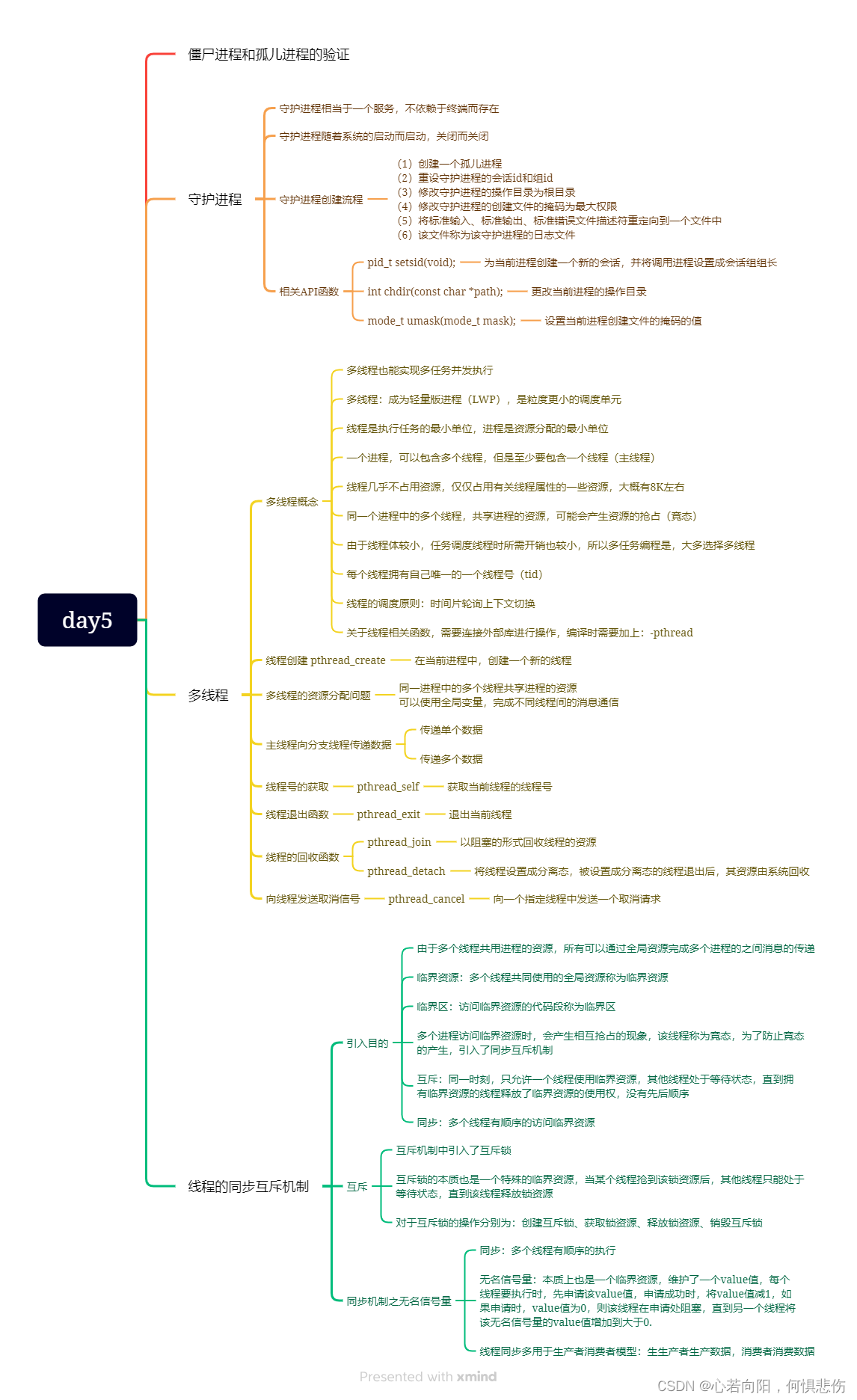IO进程线程day
2024-01-08 06:06:18

1.实现互斥机制
?
#include <head.h>
char buf[128]; //全局数组,临界资源
//1、创建一个互斥锁
pthread_mutex_t mutex;
//定义分支线程
void *task(void *arg)
{
while(1)
{
//3、获取锁资源
pthread_mutex_lock(&mutex);
printf("分支线程中:buf = %s\n", buf);
strcpy(buf, "I love China\n");
//4、释放锁资源
pthread_mutex_unlock(&mutex);
}
}
int main(int argc, const char *argv[])
{
//定义线程号变量
pthread_t tid;
//2、初始化互斥锁
pthread_mutex_init(&mutex, NULL);
//创建线程
if(pthread_create(&tid, NULL, task, NULL) != 0)
{
printf("tid create error\n");
return -1;
}
//主线程
while(1)
{
//3、获取锁资源
pthread_mutex_lock(&mutex);
printf("主线程中buf = %s\n", buf); //访问临界资源
strcpy(buf, "hello world\n");
//4、释放锁资源
pthread_mutex_unlock(&mutex);
}
pthread_join(tid, NULL); //阻塞回收线程资源
//5、销毁锁资源
pthread_mutex_destroy(&mutex);
return 0;
}2.实现同步机制
#include <head.h>
//1、创建一个无名信号量
sem_t sem;
//生产者线程
void *task1(void *arg)
{
while(1)
{
sleep(2);
printf("我生产了一辆特斯拉\n");
//4、释放资源
sem_post(&sem);
}
}
//消费者线程
void *task2(void *arg)
{
while(1)
{
//3、申请资源,如果没有资源,则在该处阻塞
sem_wait(&sem);
printf("我消费了一辆特斯拉\n");
}
}
int main(int argc, const char *argv[])
{
//创建两个线程
pthread_t tid1,tid2;
//2、初始化无名信号量
sem_init(&sem, 0, 0);
//第一个0:表示用于线程之间的通信
//第二个0:表示value初始值为0
//创建生产者线程
if(pthread_create(&tid1, NULL, task1, NULL) != 0)
{
printf("tid1 create error\n");
return -1;
}
//创建消费者线程
if(pthread_create(&tid2, NULL, task2, NULL) != 0)
{
printf("tid2 create error\n");
return -1;
}
//主线程回收资源
pthread_join(tid1, NULL);
pthread_join(tid2, NULL);
//5、销毁无名信号量
sem_destroy(&sem);
return 0;
}3.使用三个线程完成两个文件的拷贝,线程1完成拷贝前一半,线程2完成拷贝后一半,主线程回收两个分支线程的资源
1 #include <head.h>
2 sem_t sem;
3 struct Info
4 {
5 int fd1;
6 int fd2;
7 int size;
8 };
9
10 void *task1(void *buf)
11 {
12 //不断得将源文件中的内容读出,并写入的目标文件中
13 //直到源文件读取一半结束
14 char buf1[1] = "";
15 int count=0;
16 lseek(((struct Info*)buf)->fd1,0,SEEK_SET);
17 while(1)
18 {
19 memset(buf1, 0, sizeof(buf1)); //将容器清空
20 int res = read(((struct Info*)buf)->fd1, buf1, sizeof(buf1)); //从源文件中读取数据
21 count+=res;
22 //对读取的数据个数进行判断
23 if(count>((struct Info*)buf)->size/2)
24 {
25 break;
26 }
27 write(((struct Info*)buf)->fd2, buf1, res); //将数据写入目标文件
28 }sem_post(&sem);
29 pthread_exit(NULL);
30 }
31 void *task2(void *buf)
32 {
33 sem_wait(&sem);
34 lseek(((struct Info*)buf)->fd1,(((struct Info *)buf)->size)/2,SEEK_SET);
35 //不断得将源文件中的内容读出,并写入的目标文件中
36 //直到源文件读取后一半结束
37 char buf2[128] = "";
38 while(1)
39 {
40 memset(buf2, 0, sizeof(buf2)); //将容器清空
41 int res = read(((struct Info *)buf)->fd1, buf2, sizeof(buf2)); //从源文件中读取数据
42 //对读取的数据个数进行判断
43 if(res==0)
44 {
45 break;
46 }
47 write(((struct Info*)buf)->fd2, buf2, res); //将数据写入目标文件
48 }
49 pthread_exit(NULL);
50 }
51 int main(int argc, const char *argv[])
52 {
53 //判断传入的文件个数
54 if(argc != 3)
55 {
56 printf("input file error\n");
57 printf("usage:./a.out srcfile dstfile\n");
58 return -1;
59 }
60 //定义文件描述符变量
61 int fd1, fd2;
62 //以只读的形式打开源文件
63 if((fd1 = open(argv[1], O_RDONLY)) ==-1)
64 {
65 perror("open srcfile error");
66 return -1;
67 }
68 //以只写的形式打开目标文件
69 if((fd2 = open(argv[2], O_WRONLY|O_CREAT|O_TRUNC, 0664)) ==-1)
70 {
71 perror("open dstfile error");
72 return -1;
73 }
74 sem_init(&sem, 0, 0);
75 unsigned int size;
76 size = lseek(fd1, 0, SEEK_END);
77 struct Info buf = {fd1, fd2, size};
78 //定义一个线程号变量
79 pthread_t tid1,tid2;
80 //创建出一个分支线程
81 if(pthread_create(&tid1, NULL, task1, &buf) != 0)
82 {
83 printf("tid create error\n");
84 return -1;
85 }
86 if(pthread_create(&tid2, NULL, task2, &buf) != 0)
87 {
88 printf("tid create error\n");
89 return -1;
90 }
91 pthread_join(tid1, NULL);
92 pthread_join(tid2, NULL);
93 sem_destroy(&sem);
94 close(fd1);
95 close(fd2);
96 return 0;
97 }4.使用三个线程完成:线程1输出字符'A',线程2输出字符'B',线程3输出字符'C',要求输出结果为:ABCABCABCABCABC...
#include <head.h>
sem_t sem1,sem2,sem3;//无名信号量
void *task1(void *arg)
{
while(1)
{
sem_wait(&sem1);//询问当前任务的无名信号量(下同)
putchar('A');
fflush(stdout);//刷新缓冲区(下同)
sleep(1);
sem_post(&sem2);//将下一个任务的无名信号量改变为1(下同)
}
}
void *task2(void *arg)
{
while(1)
{
sem_wait(&sem2);
putchar('B');
fflush(stdout);
sleep(1);
sem_post(&sem3);
}
}
void *task3(void *arg)
{
while(1)
{
sem_wait(&sem3);
putchar('C');
fflush(stdout);
sleep(1);
sem_post(&sem1);
}
}
int main(int argc, const char *argv[])
{
//无名信号量初始化
sem_init(&sem1,0,1);
sem_init(&sem2,0,0);
sem_init(&sem3,0,0);
//定义三个线程
pthread_t tid1,tid2,tid3;
if(pthread_create(&tid1,NULL,task1,NULL)!=0)
{
printf("error1\n");
return -1;
}
if(pthread_create(&tid2,NULL,task2,NULL)!=0)
{
printf("error2\n");
return -1;
}
if(pthread_create(&tid3,NULL,task3,NULL)!=0)
{
printf("error3\n");
return -1;
}
//进程收尸
pthread_join(tid1,NULL);
pthread_join(tid2,NULL);
pthread_join(tid3,NULL);
return 0;
}
?
文章来源:https://blog.csdn.net/2203_75782206/article/details/135447759
本文来自互联网用户投稿,该文观点仅代表作者本人,不代表本站立场。本站仅提供信息存储空间服务,不拥有所有权,不承担相关法律责任。 如若内容造成侵权/违法违规/事实不符,请联系我的编程经验分享网邮箱:veading@qq.com进行投诉反馈,一经查实,立即删除!
本文来自互联网用户投稿,该文观点仅代表作者本人,不代表本站立场。本站仅提供信息存储空间服务,不拥有所有权,不承担相关法律责任。 如若内容造成侵权/违法违规/事实不符,请联系我的编程经验分享网邮箱:veading@qq.com进行投诉反馈,一经查实,立即删除!